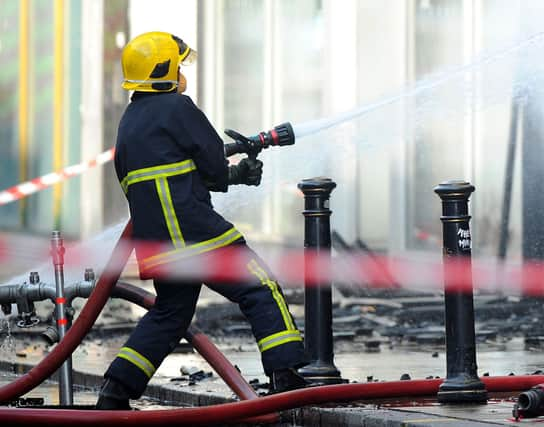West Sussex fire crews take longer to respond to emergencies


West Sussex fire crews are taking longer to respond to emergencies than they did just over a decade ago, figures show.
The Fire Brigades Union say a national slowing in fire response times is down to "huge levels of cuts" to services across England.
Advertisement
Hide AdAdvertisement
Hide AdHome Office data shows that the West Sussex Fire and Rescue Service responded to primary fires – the most serious kind – in an average of nine minutes 26 seconds during the year to September 2021.
Including one minute 19 seconds for call handling and six minutes seven seconds drive-time, that is faster than in the 12 months to September 2020, when the average response time was nine minutes 45 seconds.
But the figures show that the response time had slowed since 2011, when crews attended primary incidents in around nine minutes three seconds.
That comes despite a drop in the number of call-outs to primary fires, which fell from 1,127 in 2011 to 839 last year.
Advertisement
Hide AdAdvertisement
Hide AdThe Fire Brigades Union say there has been a long-term slowing of response times nationally due to decades of funding cuts resulting in fewer firefighters, fire engines and stations.
Andy Dark, assistant general secretary of the FBU, said: "It is no surprise that response times are increasing – central government cuts are entirely to blame for this reduction in services and our communities deserve better.
"The Government is playing roulette with our lives and our properties.
"We are being left for longer as our houses burn."
Separate figures show that since 2011, the number of full-time equivalent firefighters employed by the service dropped from 211 to 172 last year – an 18% fall.
Advertisement
Hide AdAdvertisement
Hide AdAnd the brigade's overall staffing levels were down 14% from 383 in September 2011 to 330 in 2021.
Staffing levels have dropped significantly nationally with brigades now employing 25 per cent fewer non-managerial firefighters and 22 per cent fewer total staff members than were in role in 2011.
Across England, the average response time for primary incidents – those which have most potential to cause harm to people or properties – is now 37 seconds slower than it was in 2010.
Last year, it was six seconds slower than recorded in the year to September 2020.
Advertisement
Hide AdAdvertisement
Hide AdFire Minister Lord Greenhalgh said thousands of firefighters had been recruited across the country in 2021 and that fire and rescue authorities would receive around £2.billion to support their work.
He added: “Firefighters work tirelessly every day to protect our communities and the government has consistently given them the resources they need to keep people safe.
“Fire response times can fluctuate annually depending on many factors such as road traffic and weather but have remained relatively stable since March 2015.”
A spokesperson for West Sussex Fire & Rescue Service said: “We would like to reassure our residents that there has been continued significant investment in West Sussex Fire & Rescue Service.
Advertisement
Hide AdAdvertisement
Hide Ad“This is used to address the complex issues around response times, with the aim of always getting to people in need as quickly as possible.
“There is further major investment proposed in 2022/23 budget, which goes before West Sussex County Council on Monday, allowing the fire and rescue service to deliver on its proposals set out in its Community Risk Management Plan.
“One of the proposals outlined in the plan will see fire cover increased at a number of the service’s fire stations in the Mid Sussex and Adur districts. This increase in on-duty staff is projected to reduce response times by 34 seconds in Adur and one minute in Mid Sussex District. This is also anticipated to have a 13 second service-wide improvement on responses across the service.”